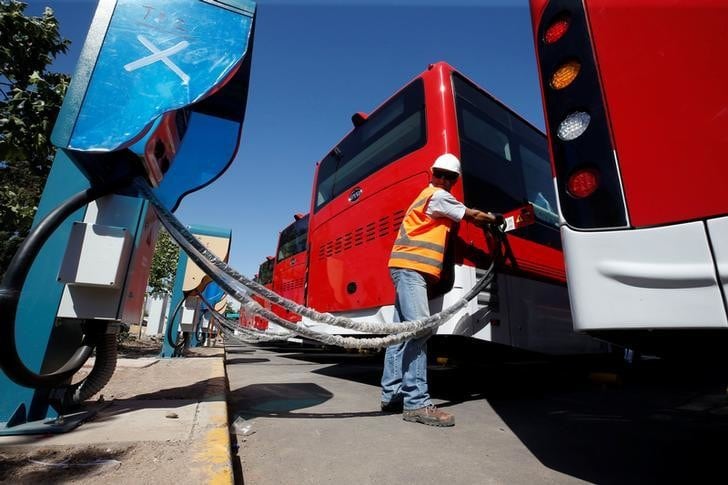Innovative investments could decarbonize transport in India. Here’s how

Buses are the most affordable mobility option in India and therefore could be the first ones to decarbonize transport in India Image: REUTERS/Rodrigo Garrido.
Christoph Wolff
CEO, Smart Freight Centre, Amsterdam, Honorary Professor Economics & Social Sciences, University of Cologne
Get involved with our crowdsourced digital platform to deliver impact at scale
Stay up to date:
Energy Transition
Listen to the article
- Investment in electric bus fleets could decarbonize transport in India, reducing GHG emissions and improving air quality.
- Electric buses provide scale for global asset owners to invest capital in “pay per use” model, easing expenditure constraints and democratizing adoption.
- Large-scale purchasing of batteries would kickstart the government’s new 'Production Linked Incentive' programme and boost local manufacturing.
India is home to 14 of the 20 most polluted cities in the world. Decarbonization of the public transport system can help improve the air quality in cities while accelerating an e-transport revolution. Focusing on innovative investment schemes that incentivize procurement of e-buses will be key to scaling these efforts and quickly transforming the mobility sector.
An investment opportunity to decarbonize transport
India has one of the lowest numbers of buses per every thousand people. Despite this, buses remain the unsung hero of Indian mobility ecosystem. They have the highest mobility share across all modes of motorized transport. Buses are the most affordable mobility option and play a vital role in helping the masses earn their livelihood.
To meet the twin challenges of the pandemic and the environment, in February last year the government committed to purchasing 20,000 buses for more than 100 of its medium- to large-sized cities. This is in addition to the FAME (Faster Adoption and Manufacturing of Electric Vehicles) programme where 2,500 electric buses have been awarded to various municipalities across the country. The intention is to promote the adoption of buses powered by clean fuel (CNG, electric or hybrid) and decarbonize transport.
Major metropolitan cities like Delhi, Hyderabad, Bengalaru have launched ambitious electric vehicle (EV) adoption programmes and mandates, giving further impetus to electrification.
An annual offtake of 20,000 electric buses can have a transformational impact across the value chain and more importantly for commuters and cities. The chart below outlines potential impact of deploying 20,000 electric buses in terms of investment, battery capacity deployed, charging requirement and abatement of diesel. The Indian government has recently notified EESL as the nodal agency for aggregation of demand for ebuses thus creating an enabling framework to decarbonize the transport sector.

Such assured demand for battery capacity can trigger much needed billion-dollar investments in battery giga factories to power EVs (battery factories with a minimum annual battery production of 3 GWh). The recent announcement by the Government of India of a Production Linked Incentive scheme for battery production using advanced cell chemistry will provide major fillip for companies looking to set up cell manufacturing in India. It will have cascading impact on the electrification of other forms of transportation, such as the two-wheeler and three-wheeler market which is fragmented with a manufacturing ecosystem dependent on the import of battery cells.
Innovative financing
Innovative financing structures built on assets, data and cash flows are key for rapid deployment of electric buses given their higher upfront costs.
Broadly two market segments must be considered. Firstly, contracted payment structures with municipalities well suited for large fleets with a focus on project financing. The second category is the retail bus market with private bus operators which would require financing structures. More than 80% of the bus fleet in India is owned by private bus operators and hence an important market segment.
The current financing products for buses are commercial vehicle loans, which are designed for the established diesel bus market. Since electric buses have higher capital costs than diesel buses and require a more solution based approach, involving charging infrastructure, there is a need to develop financing solutions bundled with the product.
Since gross cost contract (GCC) – pay per km – has emerged as default model for fleet deployments under public procurement, financing solutions will be led by asset aggregators backed by equity commitments from large global funds, such as DFID UK, CDPQ, NIIF and GIC.
Currently electric bus original equipment manufacturers (OEMs) are building asset companies to generate demand for their electric buses. A typical electric bus GCC contract is for a minimum of 100 buses – translating to an average project outlay of about $12-15 million.
For retail demand, commercial vehicle loans are the dominant financial product in the market. With higher capital expenditure for EVs, there is need to bundle vehicles and financing solutions. OEMs are an important partner to develop these solutions given the rapidly evolving technology and end of life management of vehicles. Another possibility is to have intermediaries who are willing to provide buses/batteries on lease and can aggregate demand, can own the assets (in this case the buses or batteries themselves) for the long-term by taking the high upfront cost of e-buses off the operator’s balance sheet.
A network of global asset owners also pool required funding power, which exceeds capabilities of single companies or industry coalitions, thereby allowing for large-scale bundled investments and sharing of risks. Co-investments with development finance institutions such as the World Bank or with US aid agencies in India can make financing “investment grade” for institutional investors.
Looking ahead
To enable such changes, ecosystem partnerships involving OEM and asset owners would be crucial.
The World Economic Forum, could act as a conduit to enable such novel partnerships to speed the transition towards net-zero emissions in India.
These changes won’t happen overnight given the need for coordination among various stakeholders. However, the market is ripe for disruption due to high diesel prices, unprecedented liquidity globally as a fiscal impetus, and stringent emission norms.
Additionally, our estimates suggests that electric buses are more profitable compared to diesel buses for intercity applications with daily utilization of over 400 km.
An ambitious approach can accelerate the transition to electric buses and the market transition to electric – maximizing the multiplier effects in the overall EV ecosystem.
Don't miss any update on this topic
Create a free account and access your personalized content collection with our latest publications and analyses.
License and Republishing
World Economic Forum articles may be republished in accordance with the Creative Commons Attribution-NonCommercial-NoDerivatives 4.0 International Public License, and in accordance with our Terms of Use.
The views expressed in this article are those of the author alone and not the World Economic Forum.
Related topics:
The Agenda Weekly
A weekly update of the most important issues driving the global agenda
You can unsubscribe at any time using the link in our emails. For more details, review our privacy policy.
More on Energy TransitionSee all
Katie Fedosenko and Luciana Gutmann
April 15, 2024
Johnny Wood
April 11, 2024
Alexandre Raffoul and Kai Keller
April 10, 2024
Roberto Bocca
April 10, 2024
Naoko Tochibayashi and Naoko Kutty
April 10, 2024
Linda Lacina
April 5, 2024






